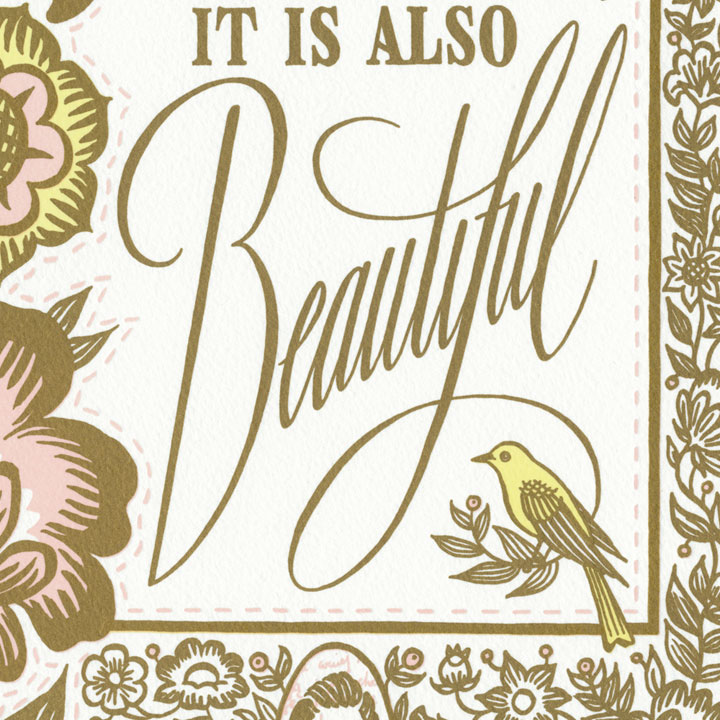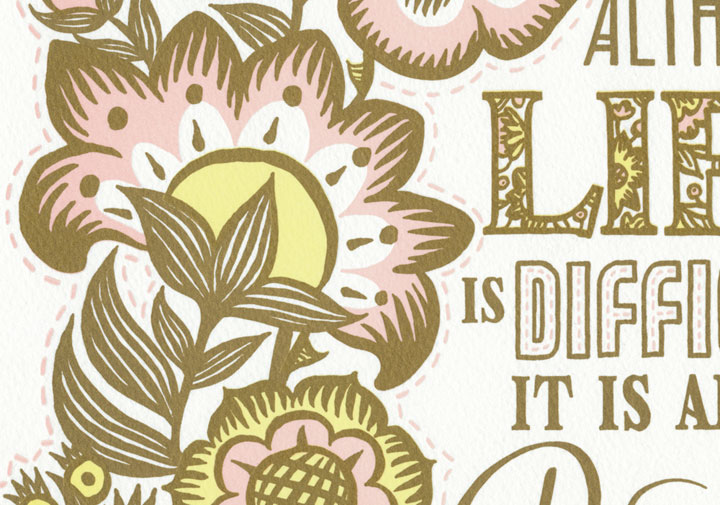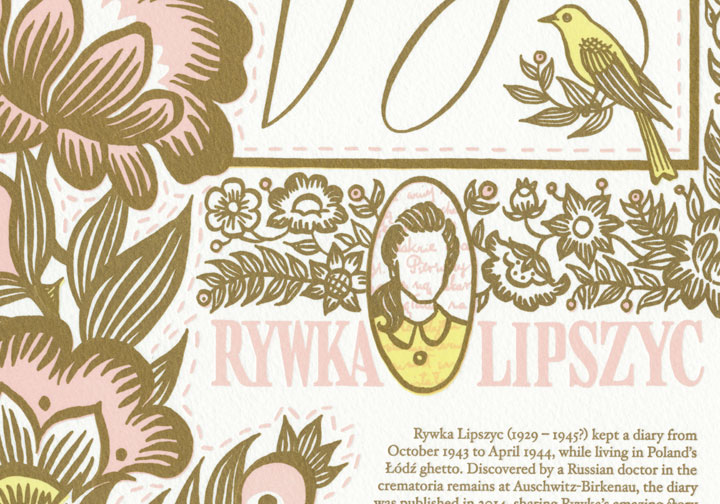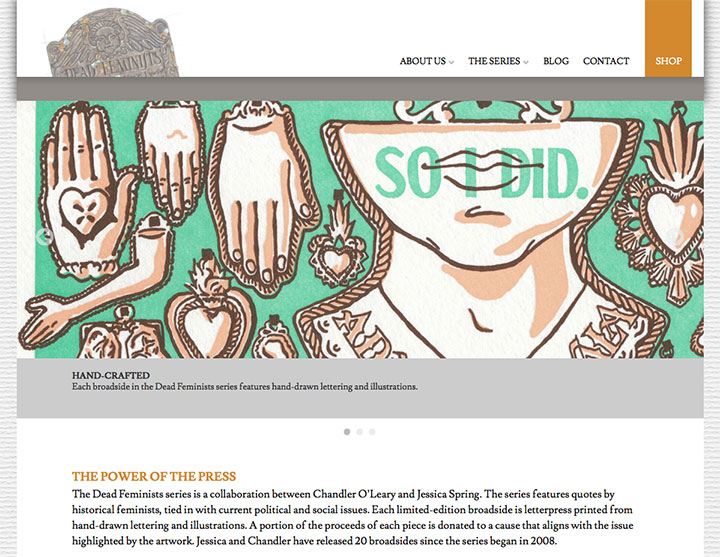Common Threads
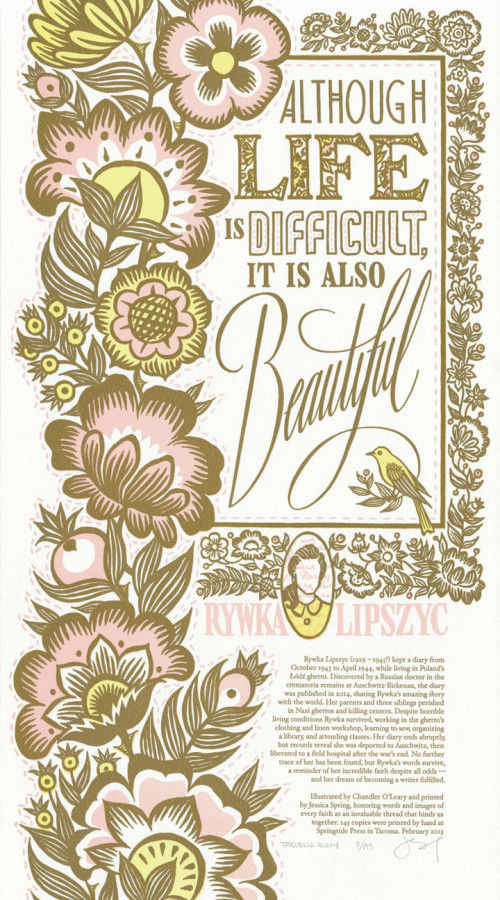
For our last broadside, we focused on a woman from the Islamic world; now we’re back with an homage to Judaica. The juxtaposition of the two pieces was no accident on our part. Yet the timing of world events was something we could never have planned. We originally meant to tie our new piece in with the 70th anniversary of the liberation of Auschwitz—last month, the anti-Semitic terrorist attacks in Paris gave us a terrible new perspective for our piece.
What really bowled us over is that the young woman we chose to highlight for the new piece underscores the relationship between the two events, the two time periods in history. You see, our gal is a historical figure, yet the world has only just discovered her. So here we present to you the words of a young writer, whose diary, along with her faith, carried her through one of the darkest times in human history:
Although life is difficult, it is also beautiful. — Rywka Lipszyc (pronounced “Rivka Lipschitz”)
Rywka’s story is astonishing, if only for the fact that it can be told at all. Rywka was a teenager living in one of the worst Jewish ghettos of Nazi-occupied Poland during World War II. By the time she started her diary at age fourteen, she had already lost all but one of her family members. While working as a factory seamstress and caring for her younger sister, she poured her heart and faith into the pages of her notebook. At times the diary is a harrowing account of wartime hardship; at others, it reads like the missives of any normal, modern teenage girl. The pages are dense but not numerous: just a few months after it begins, the diary ends abruptly—and with it most of our knowledge of Rywka’s life. We know she was deported to Auschwitz a few months later; and that her sister was murdered upon arrival at the camp. We know she was liberated from Auschwitz by allied troops 70 years ago—but then her trail goes cold, like that of so many other victims of the Holocaust. Historians are sure she did not survive for long after the liberation, but that’s all they’re sure of: no further details of Rywka’s fate have been uncovered. No photo of her exists, nor any other trace of her life beyond the diary, a few registration records, and the memories of a trio of surviving cousins living in Israel.
What is truly remarkable is that the diary survived the war, the camps and the intervening decades. A Russian army doctor allegedly found the diary in the ashes of the Auschwitz crematorium. The doctor made a few notes in the margins, and then put it away in her closet at home—for the rest of her life. Upon her death, her son found the diary, and then he stashed it away for several more decades. When he died, his daughter—the granddaughter of the army doctor—traveled back to Russia from the U.S., and found the diary among his effects. This time, however, she knew just what to do with it. She took it back with her to the States, and turned it over to the JFCS Holocaust Center in San Francisco. They then authenticated and translated the diary—and published it in book form less than a year ago.
Jessica and I were able to get a hold of the new publication at the Pacific Lutheran University library (many thanks to Holly Senn for tracking the book down for us!). In reading the text, we were struck by Rywka’s use of metaphor—particularly her mentions of flowers growing among thorns. So we took Rywka’s imagery and wove the broadside’s design and theme around it.
Common Threads is a winter garden of pale pastels and subtle metallic golds. The delicate colors and shining metallic ink (which includes real gold in the formula) represent the fragility and preciousness of life among the thorns of war and persecution. The floral motif echoes themes from Rywka’s diary, and stands for the resilience of the Jewish people—whose culture has flourished beautifully despite some of the worst trials endured by humankind.
The overall design of the broadside is based on Rywka’s dual cultural heritage. The border is reminiscent of Jewish embroidered challah covers and sabbath cloths, while the style of floral illustration is derived from Polish folk florals. The stitched lines are a nod to Rywka’s trade as seamstress, which she viewed optimistically as a way to move forward and make a living in a future beyond wartime.
To help fight anti-Semitism worldwide and defend civil rights for all, we are donating a portion of our proceeds to the Anti-Defamation League — one of the nation’s top human and civil rights organizations for over 100 years.
• • • • • • • • • • • • • • • • • • • • • • • • • • • • • • • • • • • • • • • • • • • • • • • • • • • • • • • • • • • •
Common Threads: No. 21 in the Dead Feminists series
Edition size: 145 prints
Poster size: 10 x 18 inches
Printed on an antique Vandercook Universal One press, on archival, 100% rag (cotton) paper. Each piece is numbered and signed by both artists.
Colophon reads:
Rywka Lipszyc (1929 – 1945?) kept a diary from October 1943 to April 1944, while living in Poland’s Łódź ghetto. Discovered by a Russian doctor in the crematoria remains at Auschwitz-Birkenau, the diary was published in 2014, sharing Rywka’s amazing story with the world. Her parents and three siblings perished in Nazi ghettos and killing centers. Despite horrible living conditions Rywka survived, working in the ghetto’s clothing and linen workshop, learning to sew, organizing a library, and attending classes. Her diary ends abruptly, but records reveal she was deported to Auschwitz, then liberated to a field hospital after the war’s end. No further trace of her has been found, but Rywka’s words survive, a reminder of her incredible faith despite all odds — and her dream of becoming a writer fulfilled.
Illustrated by Chandler O’Leary and printed by Jessica Spring, honoring words and images of every faith as an invaluable thread that binds us together.
Now available in our new web shop!
• • • • • • • • • • • • • • • • • • • • • • • • • • • • • • • • • • • • • • • • • • • • • • • • • • • • • • • • • • • •
Speaking of which, we finally have a website dedicated to the Dead Feminists series. It has been years in the making, and while we haven’t quite worked out all the kinks yet (bear with us on that), we’re thrilled to be up and running at last. Many thanks to our amazing web designers, Elizabeth Anderson and Paul Ferguson, for making it all happen!
On the new site you’ll find the stories behind each broadside in the series, glimpses into our process, information about our live events, and of course the new web shop (which contains all our broadsides and postcards). So head on over and take a gander!
![Chandler O'Leary [logo]](https://chandleroleary.com/wp-content/themes/chandleroleary/images/logo.png)
